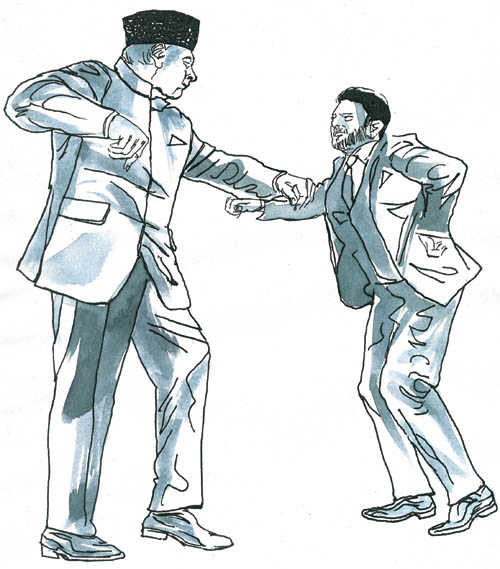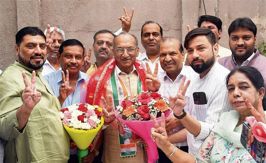
Illustration: Sandeep Joshi
Harish Khare
In recent months we have been flooded with ‘memoirs’ by a number of political leaders. Pranab Mukherjee has just published the second installment of his planned three-part memoir. This one is called The Turbulent Years: 1980-1996. The first one was titled The Dramatic Decade: The Indira Gandhi Years. Then, we have had Sharad Pawar write his book. Also, ML Fotedar, Salman Khurshid and, earlier, K. Natwar Singh have favoured us with their accounts of history.
The art of memoir-writing is an underdeveloped craft in India. Most memoirs leave a rather unsatisfactory taste in the mouth. In contrast, in the West, it is an expected norm that after leaving office, a President or Prime Minister would ‘do’ a memoir. It is an organised enterprise involving researchers, archivists, ghost-writers, copy editors, and others. Of course, it is also a lucrative proposition.
On the other hand, in India most political leaders write their stuff in a hush-hush manner. Rarely do they make an attempt to go back to their colleagues (leave alone rivals) to seek a clarification, an additional input, an anecdote. Also, most Indian leaders make the mistake of going to Indian publishing houses, which are notoriously tightfisted.
However, there is a mental block somewhere among Indian memoirists. A political leader who chooses to pen should not be afraid to be as frank as possible without, of course, being mean or malicious.
A memoir is necessarily a selective, individualistic cataloguing of facts, faces and forces. It means wading through, what Margaret Thatcher, called “blizzards of fact and interpretations.”
It is not an undertaking to be taken lightly. A memoirist’s dilemma was succinctly defined by Margaret Thatcher: “The wisdom of hindsight, so useful to historians and indeed to authors of memoirs, is sadly denied to practising historians.” A memoirist then takes up the role of a historian who is obliged to educate the future generations in the complexities, nuances and emotions in the choices before the decision-maker. A necessary requirement of storytelling on the part of the memoirist is sharing with the reader the personality profiles of dramatis personae. Also, an easy, effortless willingness to acknowledge differences and disputes.
Most of our leaders feel constrained to justify — despite all the counter-evidence of history — their record. Perhaps, they feel inhibited because of an apprehension of political retribution or even a fear that unflattering details about a leader would be exploited by the rivals.
As Condoleezza Rice wrote in her book No Higher Honour, there is no real substitute for literally being thrown into water at the deep end. “It is one thing to read about it and quite another to be a central, maybe the central, character in a drama.”
All leaders — except in India — make mistakes and have a difficult time coming to terms with the demands of the high office. And because our leaders refuse to acknowledge having made any mistake, they continue to make the same mistake over and over.
A few days ago, The Tribune (as also many other newspapers) published on the front page a picture of the former Chief Minister of Jammu and Kashmir, Dr Farooq Abdullah prancing on a stage with Bollywood actor Ranvir Singh. The good doctor seemed to be thoroughly at ease, performing a gig.
That is quintessential Farooq Abdullah. At total contrast to the sombre and sober late Mufti Mohammad Sayeed. But then, many people do not remember that Farooq – and, not Rajiv Gandhi — made the first dynastic succession in Indian politics. His accession was the first application in the political arena of traditional principle of primogeniture.
It may also be recalled that the most memorable moment of his first term was when he was spotted gamboling around on a motor cycle with a beautiful actress. He couldn’t care less if he was seen as a frivolous man, unequal to the task of governing a difficult state. His stunt with Ranvir Singh 30 years later only tells us he remains unchanged, unreformed and unconcerned. But then, he also has a canny appreciation of his own importance in New Delhi’s calculus of compulsions.
American presidential electoral politics is a somewhat intriguing concoction. Most Indians find it difficult to make sense of such terms as caucus, primary, electoral college, winner-takes-all, super-lobbyists, etc. It is complex and intricate because it is hugely democratic in form, if not necessarily in practice. Anyone can challenge anyone. No one has a dynastic licence like the Gandhis have in the Congress. There is nothing like the RSS which controls and dictates the BJP. Political parties are not personal, family outfits like, say, Ram Vilas Paswan’s. There is no ‘high command’ which can deny party ticket to an inconvenient leader.
This very democratic nature of American politics also makes it undisciplined, unruly and chaotic. Big money plays a very critical role, as does the advertising agent. Those with family money (like a Donald Trump) can inject themselves into the electoral process of the two leading political formations: the Republican Party and the Democratic Party.
The primary system is a gruelling, exhausting and, at times, humiliating process for presidential candidates. But it is also the most democratic way, a kind of ‘job interview’ with the voters. It forces the contenders to spell out their stands on issues. No one gets away with false or sweeping promises or a ‘jumla’.
This year, the race in the Republican Party has got livened up by the entry of the very, very maverick Donald Trump. However, it is in the Democratic Party that another outsider – Bernie Sanders — has suddenly become a serious contender for a presidential nomination.
Till last week, Hillary Clinton was deemed to be an easy shoo-in to be the Democratic Party’s presidential candidate. She had behind her the full weight of what is called “the establishment.” She was — and, still is – the frontrunner to be the first female presidential nominee for a major party. Some even confidently suggested that she would be the first woman occupant of the White House.
Yet, America being America, everyone has to earn a leadership spot. So, in came the Iowa caucus vote on February 1. And, Senator Sanders finished so close to beating Clinton that he is seen as the winner.
Who is this man, this Bernie Sanders?
The most remarkable thing about Bernie Sanders is that he is the first American politician in a long time to call himself a “socialist”. He prefers to describe himself as a “democratic socialist”, as someone who is dead opposed to what he calls the “casino-capitalism process” in the United States. The rise and support for both Sanders (among the Democrats) and Trump (among the Republicans) testify to the populist and anti-establishment mood in America.
In 1996, Bernie Sanders won a seat in the House of Representatives from Vermont. In that campaign, he had marketed himself as a total outsider, an unapologetic challenger to the prevailing orthodoxy of the mainstream politics. He won. And, wrote a book: Outsider in the House. In 2006, he won a Senate seat, still playing the “outsider card”.
Now, in his presidential quest, he has reissued that book, with a catchy addition to the title: Outsider in the White House. And, in the preface, he says that his campaign is against what he calls “soulless politics”. His mantra is simple: “Elections should be influenced by grassroots movements and unexpected coalition, not by the cult of personality or a billionaire’s checkbook.”
Unexpected coalition? Sounds like Arvind Kerjriwal (minus the cult of personality)!
Many readers have responded to last week’s Kaffeeklatsch in which the question was asked as to why Mahatma Gandhi was killed. I am reprimanded for not having read Nathuram Godse’s testimony “Why I killed Gandhi”. My point was and remains that Godse was not alone. He may have pulled the trigger, but he represented larger forces and a vicious ideology that continues to gnaw at our nation’s vitality. And we need to keep asking ourselves not who but why this saint was killed.
Come to my parlour, for coffee.



























